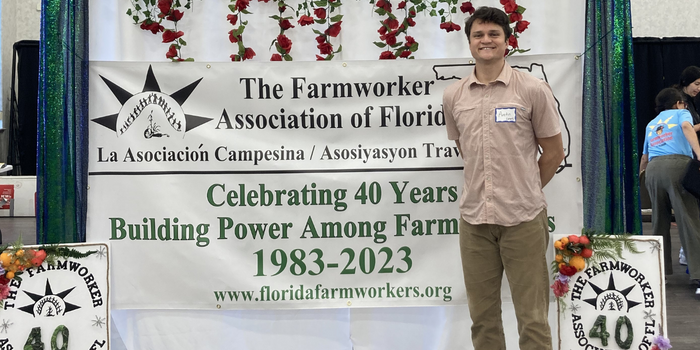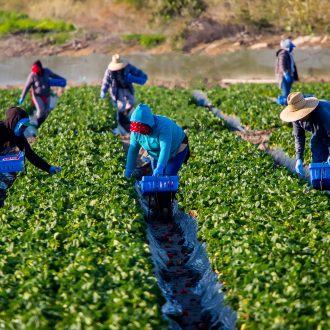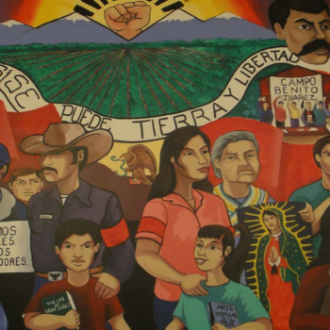
Written By: Austin Spence, NFWM’s Duke Divinity Intern
On March 5, Julie Taylor (NFWM’s Executive Director) and I had the pleasure of celebrating the Farmworker Association of Florida’s (FWAF) 40th anniversary. We were welcomed with hugs from long-standing partners, a tote bag commemorating the celebration, and a general atmosphere of collaboration and joy. Once we got settled in, a moment came that I had longed to be part of: The Farm Worker Clap. It is a slow, building wave of claps in unison that increase in tempo until we are all clapping profusely and some hollers can be heard around the room. If there was any doubt of the unity in this gathering, it was gone now. Nezahualcoyotl Xiuhtecutli, “Neza,” the general coordinator, was MCing the event, inviting certain partners and important figures in the work of la lucha, “the struggle,” to speak about the past 40 years. The founding partners of the FWAF were able to speak about the genesis of this movement in Florida.
 The time then moved to some segments of appreciation of partner and affiliate leaders who have been alongside the movement. NFWM was recognized as a valuable longtime partner and received a beautiful certificate in thanks for constant solidarity and willingness to show up for farm workers alongside FWAF. As far as the focus on farm workers went, it was encouraging to see so much support from outside of the immediate farm worker community. A city official was there, as well as a few farm worker groups from around the country, including New Jersey and California!
The time then moved to some segments of appreciation of partner and affiliate leaders who have been alongside the movement. NFWM was recognized as a valuable longtime partner and received a beautiful certificate in thanks for constant solidarity and willingness to show up for farm workers alongside FWAF. As far as the focus on farm workers went, it was encouraging to see so much support from outside of the immediate farm worker community. A city official was there, as well as a few farm worker groups from around the country, including New Jersey and California!
As the celebrations came to an end, I was grateful to get a glimpse of how farm worker groups are run, by sitting in on the General Assembly held after lunch. Earlier in the program, the group was recognized by their success in leadership development, which meant growing leaders from the ground up. I love this structure. It establishes leaders who are intimately connected to the work of the farm workers, and committed to justice rolling down like waters. In the assembly, representatives were welcomed in and priorities of each city were nominated towards the small list of top priorities to focus on for the next few years. This was very democratic, so that the individual may not speak for the masses within the group. Out of the large list of priorities, the members (about 70) voted to focus on immigration/citizenship rights, ability to receive a driver’s license, healthcare access, labor rights, and finally quality food access in schools and education. As International Women’s Day had just passed, it is of note that the group made special efforts to hear the calls of the community to integrate women into the work more by encouraging courses/ teachings that taught women reading and writing skills. The leadership remained very supportive and willing to act on the issues raised by the community.
My general feelings and takeaways from this time is that while the struggle is still on, the workers are many. I was grateful to see some of the fruits of the labor here at NFWM, that through these great relationships made with farm workers, our ministry is proving impactful on the situation at hand. Standing in solidarity with farm workers means being a voice in the spaces that they may not be heard as well. Thus advocating for the priorities is essential to our work here moving forward. I was very glad to have been present for this meeting and time of celebration, and I look forward to more opportunities to hear from farm workers.






